Srivaishnavam Parambaryam, Traditions & The Culture that stands Class apart from others
Sri Vishnu Sahasranamam – An in-depth study that adds glorious value to His name
The Sri Vishnu Sahasranam
Translations
Sri Vishnu Sahasranamam Slokha 73 – 84 Page – 7 of 9
Sloka 73
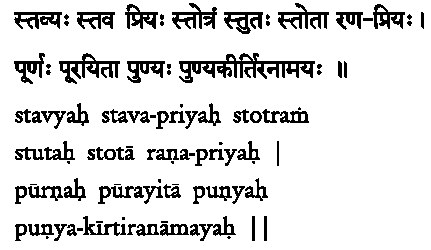
684. stavyah / a) He Who is worthy of praise. b) He Who is praised by all, but who does not have to praise anyone else. Om stavyaya namah.
685. stava-priyah / He Who is pleased by the praise in whatever form it is offered. om stava-priyaya namah.
686. stotram / The Eulogy Incarnate. Om stotraya namah.
687. stutah / He Who is praised. Om stutaya namah.
688. stota / a) He Who praises those who extol Him. b) He Who is also the form of the Eulogizer of Bhagavan. Om stotre namah.
689. rana-priyah / a) He Who delights in battle. b) He Who delights in the auspicious sounds in places of worship. c) He Who moves around happily in the form of the Sun etc. Om rana-priyaya namah.
690. purnah / He Who is complete. Om purnaya namah.
691. purayita / The Fulfiller of the desires of His devotees. Om purayitre namah.
692. punyah / a) The Purifier. b) He Who is excellent in performing pious activities. Om punyaya namah.
693. punya-kirtih / He Whose kirti or praise is also purifying (in addition to Him being the Purifier). Om punya-kirtaye namah.
694. anamayah / a) He Who removes the disease of samsara. b) He Who is beyond pain or suffering – internal, external, karma-related, etc. om anamayaya namah.
Sloka 74
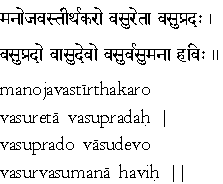
695. mano-javah / He Who is swift as thought. Om mano-javase namah.
696. tIrtha-karah / a) He Who is the source of the holy waters. b) He Who makes us cross over the ocean of samsara. c) He Whose touch of hand is purifying. d) He Who has provided simple steps to access Him through His various incarnations. Om tirtha-karaya namah.
697. vasu-retah / a) The Source of Luster. b) He Who shines like gold in the context of creation.
c) He Who is the cause or origin of the universe. Om vasu-retase namah.
698, 699. vasu-pradah / a) The Giver of Treasure (in the form of Himself). b) The Giver of Glory or Dignity. c) The Bestower of moksham. d) He Who provides the place for dwelling for all beings.
Om vasu-pradaya namah.
700. vasu-devah / a) He Who pervades and sports. b) The Son of vasudeva. c) The presiding Deity of the well-known 12-lettered vasu-deva mantra. d) The Deity Who is adored by His devotees. e) He Who lives in everything and Who keeps them moving around. Om vasudevaya namah.
701. vasuh / a) The Dweller (in the hearts of His devotees). b) The Best of wealth that is sought after. c) He Who resides in the Milk-Ocean. d) He Who is in the form of the vasu-s. e) He Who lives in everything and in whom everything lives. f) He Who conceals Himself (from those who are not devoted to Him). g) He Who is the final dwelling place for all. Om vasave namah.
702. vasu-manah / a) He Who has a Mind which thinks of His devotees as a treasure. b) He Whose mind is always with vasudeva. c) He Who has a golden mind – pure, without any afflictions. d) He Who has a pure mind (He dwells in every thing without distinction). e) He Who has a mind which is filled with vatsalyam to His devotees. f) He Who has a mind that leads to His removing the difficulties of His devotees. g) He Who has complete knowledge of the type of body and other needs of all beings. h) He Whose mind was with bhishma as he lay in his death-bed of arrows. Om vasu-manase namah.
703. havih / a) The Sacrificial Offering. b) He Who is satisfied or pleased. Om havishe namah.
Sloka 75
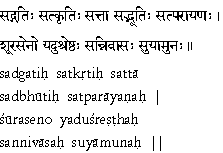
704. sadgatih / a) He Who who provides the right path for the good. b) He Who is Himself the right path for the good. c) He Who has superior intellect. d) He Who is attainable by the good. Om sad-gataye namah.
705. satkrtih / He of lovable acts, and full of good actions. Om satkrtaye namah.
706. satta / Existence Incarnate. Om sattayai namah.
707. sadbhutih / a) The wealth, in all forms, for the good. b) He Who is endowed with rich glories (aisvaryam). c) He Who alone truly exists. d) He Who manifests Himself in infinite forms. om sad-bhutaye namah.
708. satparayanam / a) The Support for the good. b) The supreme Goal for the good. c) He Who has the good people as His support. om satparayanaya namah.
709. sura-senah / a) He with a valiant army. b) He Who keeps everything that moves around, bound together and functioning as a unit. Om sura-senaya namah.
710. yadu-sreshthah / a) The pre-eminent among the Yadavas. b) He Who is Best among those who strive (for the redemption of the jiva-s). om yadu-sreshthaya namah.
711. sannivasah / The Abode of the saintly. Om sannivasaya namah.
712. suyamunah / a) He with the delightful sport in the Yamuna river. b) He Who is attended by the good Yamunas. c) He Who has beautiful collyrium in His eyes. d) He Who lifts up and protects the jivas during the time of pralaya. Om suyamunaya namah.
Sloka 76
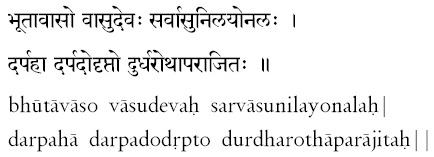
713. bhutavasah / a) He Who is the abode of all creatures. b) He Who dwells in the hearts of His devotees. c) The dwelling place of the Great Elements. Om bhutavasaaya namah.
714. vasudevah. / Om vasu-devaya namah. [This nama has been covered under nama 700]
715. sarvasunilayah / The Abode and support of all souls. Om sarvasunilayaya namah.
716. analah / a) He Who is never satisfied that He has done enough for His devotees. b) He Who cannot tolerate the offense committed to His devotees. c) He Who receives the prana sakti as His own and functions in the form of the jivatma (Sri Samkara). d) He Who is beyond smell etc. e) He Who is unlimited (in His Glories) (alam – paryapti – end). f) He Who is in the form of Fire. g) One Who has no end (alam – paryapti – end). h) One Who has no opposition (alam – opposition). i) He who rejuvenates His devotees who intensely long for Him (an – pranane ). Om analaya namah.
717. darpaha / The Destroyer of pride. Om darpaghnaya namah.
718. darpa-dah / a) The Bestower of pride (to His devotees). b) The Bestower of beauty and attractiveness in everything. om darpa-daya namah.
719. adrptah / a) He Who is not proud Himself. Or driptah. b) He Who is ever happy; c) He Who is proud. Om adrptaya namah.
720. durdharah / a) He Who is difficult to control (as child Krishna). b) He Who cannot be constrained by the evil-minded (Duryodhana). c) He Who is difficult to be held in concentration (except by those of trained mind). Om durdharaya namah.
721. aparajitah / The Invincible. Om aparajitaya namah.
Sloka 77
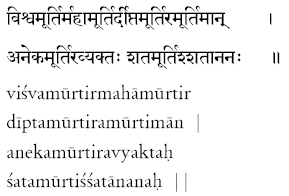
722. visvamurtih / a) He Who has the Universe as His body. b) He Who has a beautiful Form that finds entry into the mind, eyes, etc., of His devotees. c) He Who has maya sakti in the form of the Universe. d) He Who has a Form that can induce maya in everything. Om visva-murtaye namah.
723. mahamurtih / a) He of Immense form. b) He Who is immensely worthy of worship. Om mahamurtaye namah.
724. diptamurtih / He with a shining form. Om diptamurtaye namah.
725. amurtiman / a) He Who has even the subtle and formless things as His possessions. b) He Who Forms that are not the result of karma. c) He Who has a disposition that is not hard, inflexible, etc. d) He Who has Forms that are indescribable, and not fixed. e) He Who takes whatever Forms He pleases as His incarnations, and thus One Who has no fixed forms. Om amurtimate namah.
726. anekamurtaye / He of many forms. Om anekamurtaye namah.
727. avyaktaha / He Who is not manifest; He Who cannot be easily realized. Om a-vyaktaya namah.
728. Satamurtisa / He with a hundred forms. Om satamurtaye namah.
729. satanana / a) He Who is many-faced. b) He Who has provided many different means (such as nose, mouth, etc.) for life to be sustained. c) He Who has created various life-forms and provided easy means for their survival. d) He Who is viewed in different “faces” (in different ways) by different faiths. Om satananaya namah.
Sloka 78
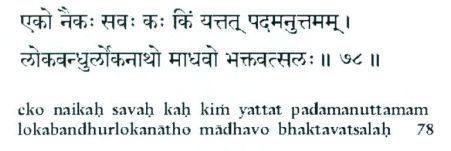
730. ekah – One Who is Unique and matchless in all respects. om ekaya namah
731. naikah- He Who is not One only. om naikaya namah
732. sah – a) He Who spreads knowledge. b) He Who is the final authority on all knowledge. c) He Who destroys all obstacles to His devotees. d) He Who is easily accessible, to the point of being pointed out as “He” by the youngsters of Ayarpadi. e) He Who is of the form the soma sacrifice (when the nAma is taken as savah). f) He Who is the final Knowledge, and Who dwells everywhere (savah). om saya namah
733. vah – The Dweller. om vaya namah
734. kah – a) He Who shines. b) He Who is invoked or praised through words by devotees. c) He Who is the personification of happiness. d) He Who remains an unanswered Question Mark when approached through “intellection”. om kaya namah
735. kim – a) He about Whom all questions are asked by seekers of Truth (such as – Where is He, What is He, Who is He, etc.). b) He Whose praise is sung by His devotees, c) He Who is fit to be enquired about or sought after. om kime namah
736. yat – a) He Who takes efforts. b) That Which already exists. c) That from Which everything in this Universe came about. om yate namah
737. tat – a) He Who increases (the jnanam and bhakti about Him in the devotees). b) He Who increases the kIrti (fame) of His devotees. c) He Who expands the Universe from its subtle form to its visible form. d) He Who is not seen by senses etc. om tate namah
738. padam anuttamam – a) The Supreme Goal. b) The Unexcelled Protector of His devotees. om padaya anuttamAya namah
739. loka-bandhuh – a) The Relative of the World. b) One to Whom everything is bound since He is their Support. c) One to Whom everything is related since He is their Best Friend – their Father. d) One Who provides instructions as a kinsman on what is right and what is wrong through the SAstra-s. e) One Who limits everything through things such as limited life etc. om loka-bandhave namah
740. loka-nathah – a) The Protector of the world. b) He Who bestows aisvaryam on all as a result of His unlimited aiSvaryam. c) He Who is sought after or prayed by all. d) He Who shines in the world, or He Who regulates the world by energizing. e) He Who comforts or blesses the world. f) He Who rules over the world. g) He Who gives troubles as needed to those who need to be disciplined. om loka-nathaya namah
741. madhavah – The Consort of Lakshmi. a) The Consort of MA or Lakshmi. b) The Bestower or Propounder of Knowledge about Himself. c) One Who is attained through the madhu vidyA. d) One Who is attained through mauna, dhyAna and yoga. e) One Who is born in the race of madhu, a yAdhava. f) The nAma that reveals the eternal relationship of the Mother and Father with the rest of the Universe. g) One for whom there is no Lord above. om madhavaya namah
742. bhakta-vatsalah – a) Affectionate towards the devotees, b) He Who goes to the devotees who makes offerings to Him through yajna, c) He Who takes the devotees to Him, who are dear to Him like a calf to the cow. om bhakta-vatsalaya namah
Sloka 79

suvarna-varno hema’ngo vara’ngah candana’ngadI |
vira-ha vishamah sunyo ghrtasir_acalas_calah ||
743. suvarna-varnah – The golden-hued. om suvarna-varnaya namah
744. hema’ngah – He of golden-hued limbs. om hema’ngaya namah
745. vara’ngah – a) He Who displayed His Divine Form to devaki in response to her prayers. b) He Who has beautiful limbs. c) He Who has a lovable Form that is pleasing to those who meditate on Him. om vara’ngaya namah
746. candana’ngadI – He Who is adorned with delightful armlets. b) He Who is besmeared with pleasing sandal. c) He Who provides us all with the means and ways to be happy. d) He Who has a’ngada as His pleasing devotee. om candana’ngadine namah
747. viraha – a) The Slayer of the strong demons. b) The Destroyer of those who indulge in vain arguments and distract others from meditating on Him. c) The Destroyer of the bonds of yama. d) He Who leads the jivas to moksha by showing them the right path. e) He Who provides different ways for His creations to move around. f) He Who is accompanied by Garuda and Vayu when destroying the asura-s. g) He Who ends the various paths that go from birth to birth. om viraghne namah
748. vishamah – a) He of unequal (conflicting) acts towards His devotees vs. His enemies. b) He for Whom there is no equal. c) He Who destroyed the effect of the poison that was consumed by rudra during the churning of the Milk Ocean. om vishamaya namah
749. sunyah – a) He Who is devoid of defects when He takes births as one of us. b) He Who is without any attributes (advaita interpretation). c) He Who goes everywhere, or is present everywhere. d) He Who cleans out everything at the time of pralaya. e) He Who is not accessible when we seek Him through our senses. om sunyaya namah
750. ghrtasIh – a) He Who sprinkles the world with prosperity. b) He Who is desirous of the butter in the gopis’ houses. c) He from Whom all desires have flown away. d) He Who enjoys the offering of ghee in the homa etc. om ghrtasishe namah
751. a-calah – a) He Who is unshakable against His enemies. b) He Who is immutable in His nature, power, wisdom, etc. c) He Who does not move anywhere, because He is everywhere already. om acalaya namah
752) calah – a) He Who swerves. b) He Who moves (in the form of vAyu etc.). c) He Who rushed out of SrI vaikunTham at the cry for help from Gajendra. d) He Who is full of leelas. om calaya namah
Sloka 80

a-manI manado manyo loka-svamI tri-loka-dhrt |
su-medha medhajo dhanyah satya-medha dhara-dharah ||
753. a-manI – a) He Who is not proud. b) He Who does not mistakenly identify things such as the body with Atman. c) He Who is beyond all measure in all respects. Om a-manine namah.
754. mana-dah – a) He Who honors others. b) He Who confers rewards on His devotees, or denies rewards for the unrighteous (Sa’nkara). c) He Who removes the false understanding of Atman in true seekers, or induces a false sense of Atman in non-seekers (Sa’nkara). d) He Who gives spiritual enlightenment to His devotees. e) He Who gives a measure and dimension to everything in the Universe. Om manadaya namah.
755. manyah – The Object of honor. Om manyaya namah.
756. loka-svamI – The Master of the Universe. Om loka-svamine namah.
757. tri-loka-dhrt – a) He Who supports the three worlds (the worlds above, the worlds below, and earth in the middle). b) The Supporter of the three states of experience (waking, dream and deep sleep). Om tri-loka-dhrte namah.
758. su-medhah – The Well-Intentioned. Om su-medhase namah.
759. medha-jah – a) He Who was born as a result of a sacrifice. b) He Who is realized as a result of sacrifices. c) He Who makes His presence in the gatherings of bhakta-s. Om medha-jaya namah.
760. dhanyah – The Blessed. Om dhanyaya namah.
761. satya-medhah – a) He of true thoughts – honest, straightforward. b) He of true knowledge – with foresight and minuteness. c) He of true knowledge – of the Vedas and their numerous branches. Om satya-medhase namah.
762. dharadharah – a) He Who supported the Mountain (govardhana). b) He Who supports the earth. Om dharadharaya namah.
Sloka 81

tejo-vrsho dyut-dharah sarva-aastra-bhrtam-varah |
pragraho nigraho vyagro naika-sr’ngo gadagrajah ||
763. tejo-vrshah– a) He Who showers His splendor on His devotees in the form of His protection. b) He Who showers rain through the sun. c) He Who showers His radiance on everything. d) He Who showers His fierce weapons on His enemies in defense of His devotees. Om tejo-vrshaya namah.
764. dyuti-dharah – He Who possessed a majesty. Om dyuti-dharaya namah.
765. sarva-Sastra-bhrtam-varah – The Best among those warriors who are armed with all weapons. Om sarva-sastra-bhrtam-varaya namah.
766. pragrahah – The Controller. Om prgrahaya namah.
767. nigrahah – a) The Subduer. b) He Who has a firm control over all creation. Om nigrahaya namah.
768. vyagrah – a) He Who was very enthusiastic (to destroy the enemies of His devotee during the mahAbhArata war). b) He Who has no end. c) He Who moves around in many different ways. d) (a-vyagrah – He Who is not confused – dvaita patham). e) He Who uses Garuda as His vehicle. Om vyagraya namah.
769. naika-sr’ngah – a) He Who adopted diverse tactics for controlling His devotees’ enemies. b) He Who can be brought under control (realized) through the four horns in the form of the four veda-s. c) He Who can be controlled (reached) through the Omkara, with its four “horns” – akara, ukara, makara, and nada. d) He Who has the four horns in the form of the four Vedas, to control the world through dharma. e) He Who has many dimensions to His Lordship (prabhutvam). f) He Who has many aspects to His role as a Bestower of His devotees’ wishes. g) (eka-sr’ngah – satya sandha yatiraja) – He Who took incarnation as the one-horned Varaha. h) He Who has many rays of effulgence radiating from Him. i) He Who has provided diverse means to the different living beings to cause harm to their enemies, as also to defend themselves from their enemies. Om naika-sr’ngaya namah.
770. gadagrajah – a) The elder brother of gada. b) He Who was born as a result of mantra. c) He Who pervades those who walk and talk (gada + agra + jah). d) The Foremost among those who created sound (in the form of Vedas). e) He Who keeps the brahamana-s healthy (spiritually). Om gadagrajaya namah.
Sloka 82

771. catur-murtih – He of Four Forms. Om catur-murtaye namah.
772. catur-bahuh – The Four-armed. Om catur-bahave namah.
773. catur-vyuhah – a) He of the form of four Emanations (vyUha forms). b) He Who had four manifestations in His vibhava form (as krshna, balarama, pradyumna, and aniruddha). c) He Who manifests Himself as purusha, chandah purusha, veda purusha, and maha purusha. d) He Whose Supremacy is established by the four-fold Vedas. e) He Who is in the form of four divisions of speech (three veda-s, and ordinary speech). f) He Who has four kinds of greatness (vyuha = mahima). Om catur-vyuhaya namah.
774. catur-gatih – a) He Who is in the form of the four purushartha-s. b) He Who provides the four goals: indra, brahma, kaivalya, and moksha. c) He Who has the four gaits (vrshabha, gaja, vyaghra, and simha gati). d) He Who is the goal of the four varna-s and the four asramas. e) He Who is the Refuge for the four kinds of bhakata-s (arta, jijnasu, artharthI, and jnanI). om catur-gataye namah.
775. catur-atma – a) He Who has four forms in His vyUha incarnation. b) He Who has four manifestations in His vibhava incarnations of Krishna and Rama. c) He Who has a four-fold manifestation in His functions of creation, preservation and destruction. d) He Who is skilled in keeping His atma pure from attachment etc. (catura -caturya atma). e) He Who is behind the functions of manas, citta, buddhi, and ahankAra. f) He Who manifests Himself in four forms to support the jiva in its four states – visva, taijasa, prajna, and turiya. g) He Who is the antaryami of the four types of devotees – Arta, artharthi, etc. h) He Who created the fit being – the four-faced brahma (catura = kusala, fit). i) He Who manifest Himself in four kinds of Atmas: jiva, antaratma, paramatma, jnanatma. Om caturatmane namah.
776. catur-bhavah – a) He Who gives expression to the four vyuha forms through four kinds of actions. b) The Source of the four – varnas, asramas, purursharthas, etc. c) He Who created the four kinds of species. Om catur-bhavaya namah.
777. catur-veda-vit – a) He Who is known by those who are learned in the four Vedas. b) He Who is the Knower of the four Vedas. c) He Who makes it possible to know the four Vedas. om catur-veda-vide namah.
778. eka-pat – a) He Who manifests only a part of His mahima when He takes incarnations amongst humans. b) He Whose manifestation in the form of this Universe is only one-fourth of Himself. c) He Who is constantly on the look-out as our Sole Protector (ekapo + at). Om eka-pade namah.
Sloka 83

samavarto nivrttatma dur-jayo dur-atikramah |
dur-labho dur-gamo durgo duravaso durari-ha ||
779. samavartah – a) He Who takes incarnations again and again for the benefit of His devotees. b) He Who performs His function of creation again and again in cycles. c) He Whose true thoughts are always revolving around what He can do to help His devotees. om samavartaya namah.
780. nivrttatma – a) He whose Nature is different from, and superior to, everything else (Trascendental Form). b) He whose mind is turned away from worldly attachments. (nara-narayana incarnation). c) He who is the AtmA of those who practice the nivrtti dharma (Bestower of benefits according to karma). d) He whose nature is that He is free from the bonds of samsara, even when He takes His incarnation amongst us (Krshna incarnation). e) He who does not turn away from anything or anywhere because He is Omnipresent. (a-nivrttatmA – Sankara). f) He Who withdraws the jivas into Him during pralaya. g) He Who has permeated everything completely. h) He Who is Himself un-impacted or withdrawn with respect to the effects of pralaya of srshti. i) He whose mind turns away from any feeling of self-glory over His kirti or fame. Om nivrttatmane namah.
781. dur-jayah – a) He Who cannot be under control except by devotion. b) He Who is Invincible.
c) He Who makes it possible for us to conquer duhkham. d) He Who can be won over by difficult practices such as samadhi etc. Om dur-jayaya namah.
782. dur-atikramah – a) He Who cannot be bypassed by those who seek relief from samsara. b) He Who cannot be transgressed because of fear of the consequences of disobeying Him. c) He for whom all sorrow is bypassed. d) He by transgressing whose orders, sorrow is the result. Om dur-atikramaya namah.
783 dur-labhah – He Who is difficult to attain for those who are not single-minded in their devotion to Him. Om dur-labhaya namah.
784 dur-gamah – He Who is difficult to attain because of His Effulgence. b) He Whose True Nature can be known only with difficulty. c) He Who can be known only by the difficult process of enquiry into the Upanishads, etc. Om dur-gamaya namah
785 dur-gah – He Who is separated from us by our avidyA which acts like a fortress between Him and us. b) Nor easily realized because of unanticipated obstacles during our efforts to seek Him. c) He Whose realization is constrained by our own limitations. d) He Who causes pain and suffering to the evil-minded rAkshasa-s. e) He Who is praised by the sAma gAnam which is difficult to master. Om dur-gaya namah
786 dur-avasah – He Whose place of residence (SrI vaikunTham) is not easy to attain. Om dur-avasaya namah.
787. durari-ha – a) The Dispeller of the evil-minded enemies. b) The Dispeller of evil thoughts from the minds of the devotees. Om durarighne namah.
Sloka 84

Subha’ngo loka-sara’ngah su-tantuh tantu-vardanah |
Indra-karma maha-karma krta-karma krtagamah ||
788. Subha’ngah – a) He with a bewitching form that mesmerizes the asura-s and misleads them. b) He with an auspicious form that is meditated upon by His true devotees. c) He Who makes the ashtanga yoga successful for those who follow this path with devotion. d) He Who has beautiful gaits. e) He Who pervades everywhere at all times with His auspicious form. f) He Who makes things functional in this Universal in a beautiful way. g) He Who brings the auspicious aspects such as trust in sastra-s, guru’s words, etc., to His devotees. om subhangaya namh.
789. loka-sara’ngah – a) He Who preached the superficially acceptable goals in the world. b) He Who grasps the essence of the world like a sara’nga or honeybee. c) He Who is reachable through the essence (sara) of the vedas, namely pranava. d) He Who is the object of devotion (loka-sara). e) He Who is attracted by bhakti. f) He Who bestows moksham, and He to whom the jnani-s are attracted. g) He Who has devotees singing His auspicious qualities. Om loka-sara’ngaya namah.
790. su-tantuh – a) He who has a powerful net of threads to capture the asuras and retain them from escaping. b) He Who has expanded this Universe starting from Himself. c) He Who has progeny such as brahmA. d) He Who expanded the yadava race in auspicious way by being born as the son of vasudeva. Om su-tantave namah.
791. tantu-vardhanah –a) He Who increases the meshes. b) He Who augments the expansion of Himself into this world, by protecting it. c) He Who withdraws this world into Himself after creating it. d) He Who expanded the Vasudeva family through pradyumna and others. Om tantu-vardhanaya namah
792. indra-karma – a) He Who did all this for the sake of Indra. b) He Who is responsible for the powers of indra. c) He Who performs acts that reflect His Supreme Lordship. Om indra-karmane namah.
793. mahA-karma – He of magnanimous actions. Om maha-karmane namah.
794. krta-karma – a) He Who practiced the acts He preached to the asura-s, in order to convince them. b) One Who has achieved all there is to achieve. c) One Who keeps repeating the processes of creation etc., with perfection. d) One Who has performed acts that no one else can ever perform. om krta-karmaNe namah.
795. krtagamah – a) The Propounder of Agama-s (Spiritual texts) including those dealing with Buddhism, Jainism, etc. b) He Who propounded the Vedas – Rig, Sama, etc. c) He Who is the Originator of the pancaratra Agama. d) He Who made His appearance at Dvaraka after performing His several leelas. e) he Who makes His appearance repeatedly through different incarnations. om krtagamaya namah.

Leave a Comment
You must be logged in to post a comment.